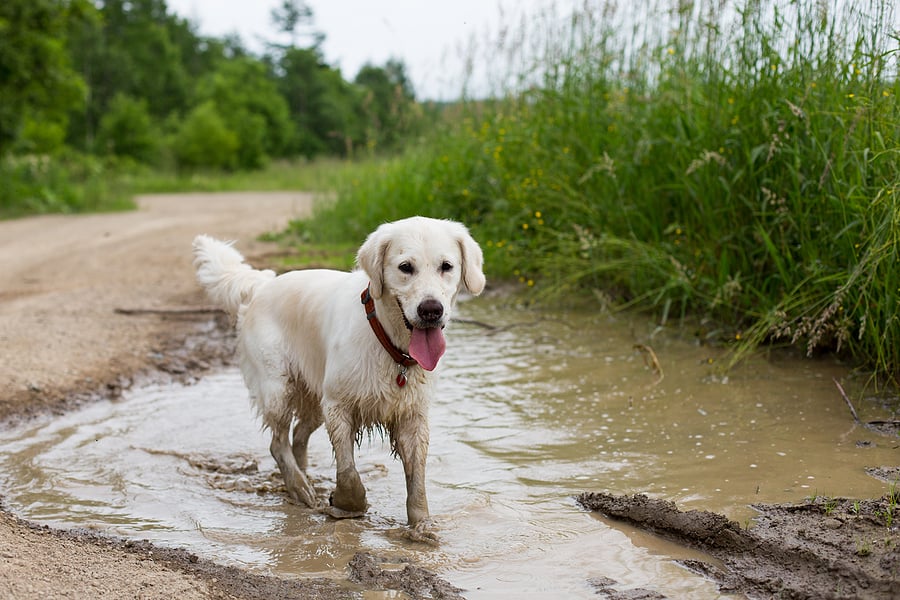Alabama Rot – what every dog owner should know
Although still considered rare, cases of Alabama rot in dogs in the UK have risen in recent years.
Alabama rot (or CRGV) is a disease that affects dogs by blocking and damaging the blood vessels in their skin and kidneys. Affected dogs will usually develop painful ulcers or sores on their legs and can eventually develop kidney failure, which is usually fatal.
Alabama rot is a condition that is really poorly understood and many veterinary clinics, particularly larger chains, and researchers and experts are working hard to learn more about it, and particularly, how it is presenting and spreading in the UK, and how and where it is posing a threat to our dogs.
So what do we know?
Certain types of environments and conditions seem to increase the risk of dogs that pass through them developing it. Clusters of cases of Alabama rot often develop within the same geographical area, and so it is thought that a combination of environmental factors cause the condition.
Alabama rot can affect any breed of dog and doesn’t discriminate in terms of age or weight.
What causes Alabama Rot?
It is not yet known what causes the disease or why some dogs suffer more than others so diagnosing and treating it can be very difficult.
There is active research ongoing to try and understand more. We do know that the disease is more common in the winter and spring and in dogs who walk in muddy, woodland areas.
What’s the worst that can happen?
Some dogs develop skin sores only, whilst others develop skin sores and kidney failure.
Unfortunately, if not spotted early, Alabama rot can lead to sudden and potentially fatal kidney failure.
What are the signs to look out for?
The following are typical signs of Alabama rot:
- Skin sores, visible swelling, red patch or skin defects not caused by a known injury. These skin lesions typically appear below the knee or elbow, and occasionally on the face or at the bottom of the chest or abdomen.
- Changes in appetite – reduced appetite, drinking more, vomiting and lethargy are signs of acute kidney injury.
If you find tell-tale sores on your dog, or they’re exhibiting the signs of kidney failure, contact your vet as soon as possible. The earlier the disease is caught and treated, the higher the chance of recovery.
Where is Alabama rot in the UK?
The disease first appeared in the UK around the New Forest area in 2012, but cases have since spread across the country, although not so many in Scotland and Northern Ireland.
In 2021, there are once again cases across the UK although the South of England has a higher proliferation of cases. There appear to be fewer cases in the coastal side of Wales.
How to avoid Alabama rot?
While it’s extremely difficult to give advice about how to avoid Alabama Rot it is recommended that dog owners wash off all mud following a wet and muddy walk, especially through woodland.
Should I be worried about Alabama rot?
The number of cases reported in the UK is extremely low, so there’s little reason to be worried. Thousands of dogs are walked in the countryside every day, and it’s important to remember that only a very small number of dogs have been affected.
What should I do if my dog is showing signs of Alabama rot?
If you’re concerned that your dog may be suffering, we urge that you contact your vet immediately for further advice as early recognition and aggressive management are likely to have the best results in helping your dog to recover.
Important note: Although CRGV can be very serious, the number of dogs affected with skin lesions and kidney failure is relatively low when we compare it to other diseases that we see in dogs (277 confirmed cases across the UK between November 2012 and July 2021).
Melina - Assistant Editor
Latest posts by Melina - Assistant Editor (see all)
- Top tips for hay fever sufferers - April 14, 2024
- Paysan Breton Cream Cheese Breakfast Wraps - April 12, 2024
- 4 Homemade Sweet Treats for Easter - March 24, 2024
- Playground Memories - March 10, 2024
- The invasion of the duvet: the ’10-second bed’ - February 20, 2024






















